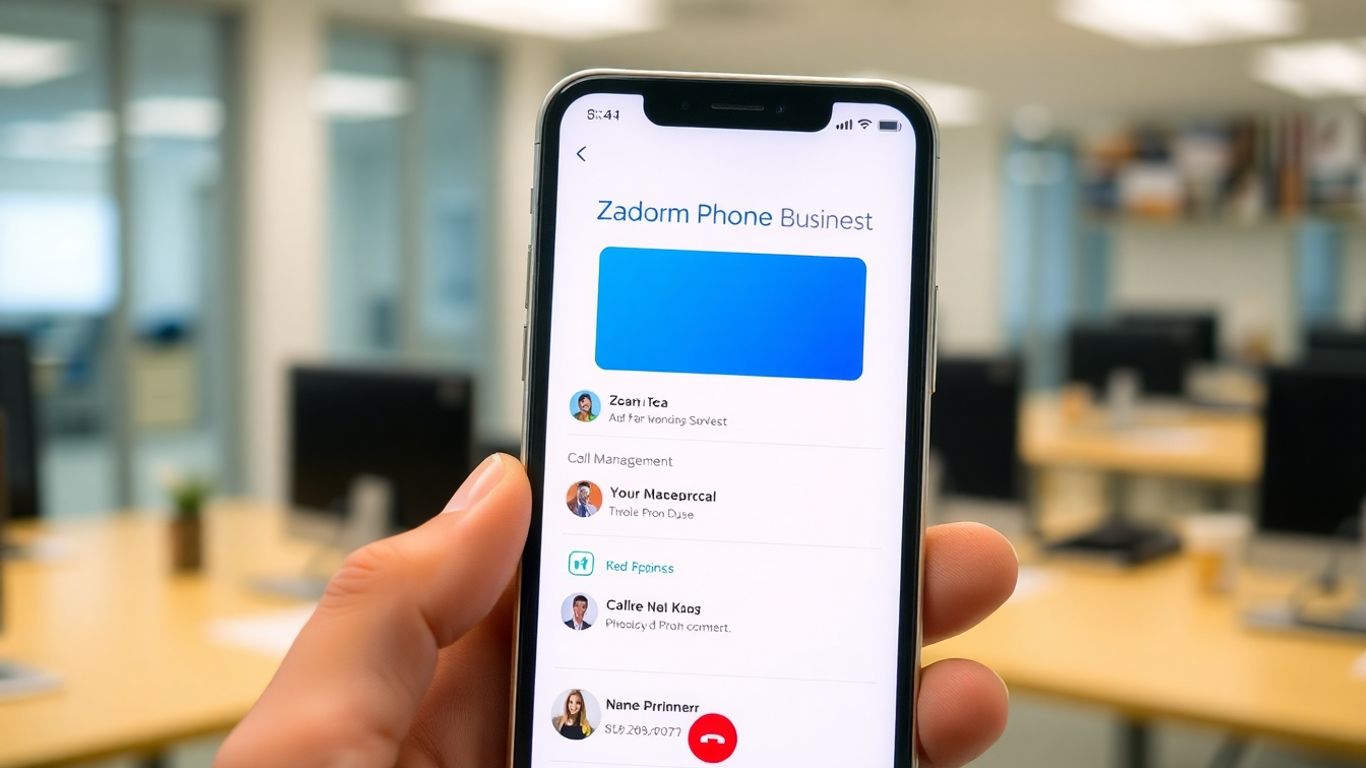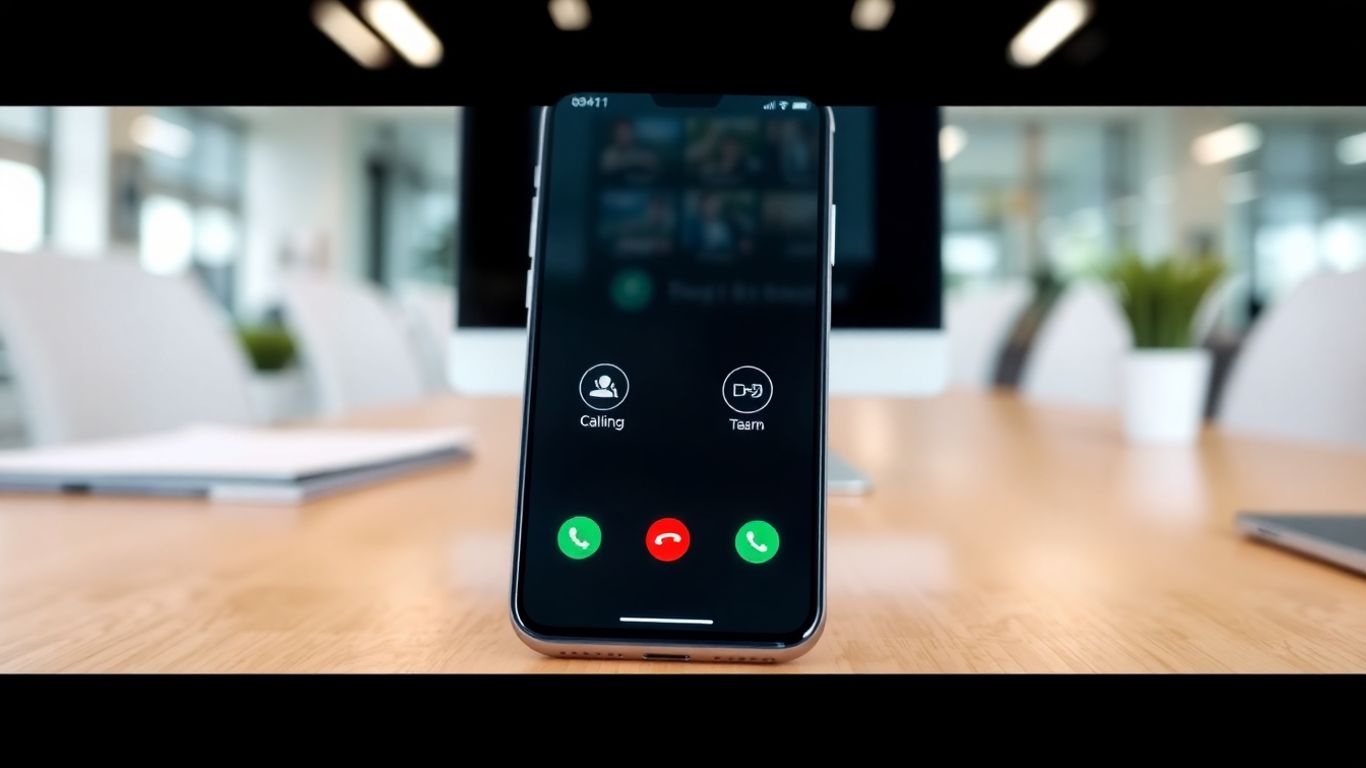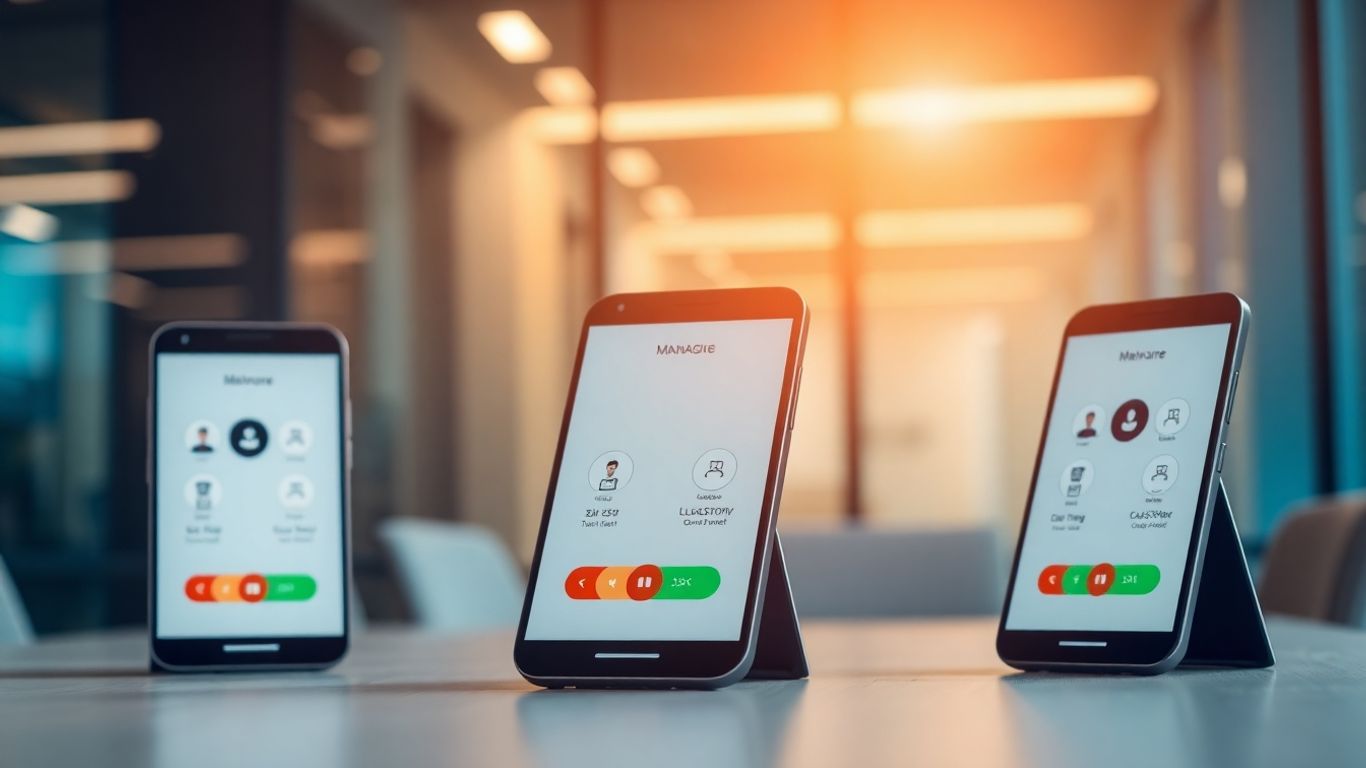Picking the right phone system for your business can feel like a maze, especially when you need it to do more than just make calls. An auto attendant can really help streamline things, making sure customers get to the right place without you having to lift a finger. We looked at some of the top options out there for 2025 that come with this handy feature built-in, so you can stop worrying about missed calls and focus on running your business. It's all about finding a phone with built-in auto attendant that just works.
Nextiva really stands out when you're looking for a phone system that does more than just calls. It's like a whole communication hub packed into one app. You get your business phone, texting, team chat, and even customer service tools all in one place. This makes managing your business communications way simpler, especially if you're trying to keep track of everything without a huge team.
One of the coolest things is how it handles incoming calls. Their auto attendant isn't just a basic "press 1 for sales." Depending on your plan, you can get pretty advanced routing. The Power Suite plan, for example, can actually look at your CRM data and send callers to the person best equipped to help them. That's pretty neat.
Beyond just calls, Nextiva lets you connect through other channels too. Think SMS, team chat, live chat, and even social media and review sites. It's a lot to juggle, but if your team can handle it, it's a unique way to manage your customer interactions across the board.
Here's a quick look at what you get:
While Nextiva offers a lot, it can get a bit pricey compared to some other options, especially if you need all those extra communication channels. Also, some users have noted that the mobile app notifications can sometimes be a little slow, which might be a bummer if you need instant alerts.
Pricing Snapshot (Approximate Monthly Per User):
They do offer a 7-day free trial, which is handy for testing things out.
RingCentral is a pretty solid choice if you're looking for a phone system that can handle your business calls with an auto attendant. They've been around for a while, and their system, RingEx, is pretty feature-rich. You can get business numbers with various area codes, which is nice for looking professional.
One of the cool things is their IVR studio. It's got this drag-and-drop thing that makes building out your call menus way easier than you might expect. You can set up multilevel menus, which is great for directing calls to the right department or person without making customers jump through a million hoops. They also include toll-free numbers and a decent chunk of minutes with their plans, which can encourage customers to call you, especially if they're overseas.
Here's a quick look at what you get with their plans:
RingCentral really shines if your team also needs collaboration tools like chat and video conferencing built right in. It's not the cheapest option out there, starting at $30 per user per month for month-to-month billing, but you get a lot for your money.
Just a heads-up, if your business relies heavily on texting, you might want to check the SMS limits. The lower-tier plans can be a bit restrictive, with only 25 texts per user per month. You might need to upgrade or pay extra if you send a lot of messages. Also, while the basic calling and chat are easy to figure out, the advanced analytics and monitoring features can take a bit of time to get used to. It's a powerful system, but there's a learning curve for those deeper functions. You can explore their business phone system options to see if it fits your needs.
They also have a ton of integrations, over 300, which is more than most competitors. This means it can probably connect with the other software you're already using, like your CRM. So, if you want a phone system that does more than just answer calls and can also help your team work together, RingCentral is definitely worth a look.
Dialpad really stands out when you're looking for a phone system that's packed with smart features, especially if AI and getting a handle on your call data is a big deal for your business. It’s not just about making calls; it’s about understanding them.
What's cool is that even their more affordable plans come with things like live call transcription and real-time analytics. Most companies charge extra for that, but Dialpad throws it in, which is pretty awesome for keeping tabs on how calls are going and what customers are saying. The desktop app is also super easy to get around, which is always a plus when you're trying to manage a busy workday.
Here’s a quick look at what makes Dialpad a strong contender:
Dialpad's strength lies in its integration of AI and analytics across its platform. This isn't just about basic phone service; it's about providing actionable insights from your communications. The ability to see call transcriptions and performance data easily can really change how you manage your team and customer interactions.
While it's a bit pricier than some basic options, starting around $27 per user per month, the value you get from the advanced features, especially the AI and analytics, often makes it worth the investment for businesses that want to be data-driven. Just be aware that some of the deeper integrations, like with Salesforce or HubSpot, might require stepping up to a higher-tier plan.

Zoom Phone might be more famous for its video conferencing, but it's also a pretty solid contender in the business phone system world, especially if you're already using Zoom for meetings. It's known for being quite budget-friendly, which is always a plus for businesses trying to keep costs down. You get unlimited domestic calling in a bunch of countries, which is a nice perk not everyone offers. Plus, the mobile app is easy to get around once you're used to the desktop version.
Setting up the auto attendant is fairly straightforward, even without a fancy drag-and-drop builder. You can create menus and ring groups to handle calls the way you need them to. It also plays nice with Zoom Meetings, so you can easily jump from a call to a video conference if needed. For businesses that are already deep in the Zoom ecosystem, it just makes sense to consider Zoom Phone for its integration capabilities.
Here's a quick look at some of its features:
One thing to keep in mind is that some of the more advanced analytics aren't included in the base package and require an add-on. Also, the pricing structure is pretty much all-or-nothing; you get the same set of features regardless of the plan you choose. It's a good option if you want a straightforward, cost-effective system that works well with other Zoom products, but maybe not the best if you need super granular control over features or deep, built-in analytics right out of the box. It’s a strong choice for companies looking for a reliable way to manage business calls without breaking the bank, especially if they're already familiar with the Zoom interface. You can find more details about their plans on the Zoom Phone website.
While Zoom Phone doesn't have a visual call flow builder, its menu-driven setup for auto attendants is still quite manageable. The system aims to provide a good balance of features and affordability, making it a popular choice for many small to medium-sized businesses.
Ooma offers a pretty solid business phone system, especially if you're looking for something that won't break the bank. They've got a few different plans, starting at a reasonable $19.95 per user per month. Even their basic plan, Essentials, hooks you up with a virtual receptionist, which is great for making your small business sound bigger. You can set up custom greetings and route calls to different people or departments, so callers don't have to wait around forever.
What's cool is that Ooma lets you customize these menus based on the time of day or even the day of the week. So, if you're closed on weekends, your callers will get a different message than if they call during business hours on a Tuesday. They also offer multilingual menus, which is a nice touch if you have a diverse customer base.
Here's a quick look at their plan structure:
Ooma also has its own line of IP phones, though they don't usually come bundled with the service plans. You can often find deals on their phones, though, like buy-one-get-one-free offers. They also support some Yealink models if you prefer those.
While Ooma's interface might feel a little dated compared to some newer platforms, it gets the job done. The core features for managing calls and setting up that professional auto-attendant experience are all there, and at a price point that's hard to beat for small businesses.
One thing to note is that while Ooma has analytics for calls, they don't offer team chat features built-in. So, if you're looking for an all-in-one communication hub with chat, you might need to consider other options or integrate a separate tool.
eVoice is a solid choice if you're looking for a business phone system that makes it easy to route calls without a lot of fuss. They really focus on making their auto attendant and dial-by-name directory super user-friendly, which is great for callers who might not know exactly who they need to reach. It's all virtual, so no clunky hardware to worry about, and their mobile app basically turns your smartphone into a full-fledged business line with features like voicemail transcription and texting.
What you get with eVoice includes the auto attendant, of course, but also call forwarding, custom greetings so you can sound professional, conference calling, call screening to avoid unwanted calls, and speed dial. Everything is managed through a central message center that syncs between your computer and your phone, which is pretty handy.
Here's a quick look at what eVoice offers:
Pricing is pretty straightforward, and they even offer month-to-month plans if you don't want to commit long-term. Plus, there's a 30-day money-back guarantee, so you can try it out without much risk. If your business grows and you need more complex routing for ten or more lines, eVoice can put together a custom plan for you.
eVoice aims to simplify call management for businesses, especially those that need clear and efficient routing. Their focus on ease of use means you can get up and running quickly without needing a tech expert on staff. It's a practical solution for businesses that want to sound professional and ensure callers reach the right department or person without delay.

Talkdesk really stands out because it's not just a phone system; it's a full-blown contact center. This means you can handle customer interactions not only through calls but also via live chat, email, and social media messages. It's a pretty big deal if you're looking to manage all your customer communication in one place.
Setting up automated greetings and call routing is pretty straightforward with their drag-and-drop designer. You can build out complex systems that direct calls to the right people or departments, or even set up chatbots for common questions. It handles more than just calls, though; it manages tasks across all those different channels you're using. Your agents get a unified inbox to see everything coming in, making it easier to switch between a chat message and a phone call without missing a beat. You can access this from your computer or your phone, which is handy.
Here's a quick look at what it offers:
While Talkdesk offers a lot of power, especially for businesses that need to manage multiple communication channels, it's definitely on the pricier side. If you only need a basic auto attendant for your phone system, this might be more than you need. But if you're aiming for a complete, multichannel customer experience, it's a strong contender.
Talkdesk's pricing starts around $85 per user per month, which reflects its extensive features. It's a solid choice for businesses that want to go beyond simple phone calls and create a more integrated customer service operation.

Genesys really shines when you're looking for something with some serious AI smarts baked right in. It's not just about answering calls; it's about making those calls work smarter for your business. Think of it as a super-powered auto attendant that can actually learn and adapt.
What sets Genesys apart is its focus on AI-driven routing. It uses predictive routing to figure out the best agent to connect a caller with, based on all sorts of factors. This means your customers get to the right person faster, which is a big win for everyone. Plus, their AI tools can help you analyze call flows and even give your agents a little boost with 'copilots'. It's all about stitching together the whole customer journey, so no matter how they contact you, the system and your team have the full picture.
Here’s a quick look at what you get:
While Genesys offers a lot of power, especially for larger operations or those with complex needs, it's worth noting that the pricing can be tiered based on the features you need. If you're a small business just starting out, you might want to compare it closely with simpler options, but for growth-focused companies wanting top-tier AI, Genesys is definitely a contender.
Twilio Studio is a bit different from the other options we've looked at. Instead of being a ready-to-go phone system with an auto attendant built-in, it's more of a toolkit. Think of it like a set of LEGO bricks for building your own custom communication flows. You can use it to design how calls and texts are handled, connecting it all with Twilio's other services.
What's cool is the flexibility. You can build pretty complex systems, like setting up call queues, creating automated surveys that go out via SMS, or even designing chatbots to handle common questions. It's all done through a drag-and-drop interface, which makes it easier to visualize your call flows. You can link phone numbers, set up automated responses, and basically create a custom auto attendant that fits your exact needs.
However, this flexibility comes with a catch. Because it's a toolkit and not a pre-built app, you'll likely need someone with some programming knowledge to get it all set up and integrated with your existing software or website. It's not a plug-and-play solution. The pricing can also be a bit tricky to pin down. You pay for each time a call flow runs, plus for every call or message sent. So, while it offers a lot of power, the costs can add up faster than you might expect, especially if you have high call volumes.
Here's a quick rundown of what Twilio Studio offers:
While Twilio Studio provides a high degree of customization for building sophisticated auto attendant systems, it's important to consider the technical resources required for setup and the pay-per-use pricing model. It's best suited for businesses that need a highly tailored solution and have the technical capacity to implement and manage it effectively.

Aircall is a solid choice if you're looking for a phone system that really shines with its inbound call handling and sales dialing capabilities. It’s got this really slick desktop interface that feels modern and, honestly, makes all the advanced features seem a lot less intimidating. You know, sometimes these systems can be a bit much, but Aircall manages to keep things looking clean.
One of the standout things here is their auto attendant. It’s got a drag-and-drop designer, which is pretty neat for setting up call flows. You can connect different queues, languages, and even use text-to-voice options for your menus. Plus, they offer smart call routing, which is a big deal. This means calls can be directed based on things like agent skills or language, or even customer data from your CRM. It’s not just a basic "press 1 for sales" setup; it’s smarter than that.
Here’s a quick look at some of its features:
Now, Aircall isn't the cheapest option out there. The starting price is around $40 per user per month, and some of the really advanced features are locked behind their higher-tier Professional plan. Also, you need at least three licenses to even get started. So, while it’s a powerful tool, especially for customer service teams, you'll be paying a bit more for the privilege.
Aircall really excels when you need sophisticated call routing and a user-friendly interface. It’s a bit pricier, but the advanced features, particularly for managing inbound customer service, make it a strong contender if your budget allows for a premium solution.
Aircall helps your business handle calls smoothly, even when you're not around. Imagine never missing a customer's question or a potential sale again! Our smart system can answer calls 24/7, sort out what the caller needs, and even set up appointments for you. It's like having a super-helpful assistant working all the time. Want to see how it works? Visit our website to learn more and get started!
So, there you have it. Picking the right phone system with auto attendant features can really make a difference for your business. It's not just about answering calls; it's about making sure customers get where they need to go without a hassle, and that your team isn't bogged down with repetitive tasks. These top phones we looked at can seriously streamline things, saving you time and maybe even boosting your sales. It’s worth taking a good look at what fits your specific needs and budget. Getting this part right means you can focus more on running your business and less on managing phone lines.
Think of it like a smart receptionist for your business phone. Instead of a person answering every call, the auto-attendant system greets callers, asks them what they need, and then sends them to the right person or department. It's like a digital helper that makes sure calls go where they're supposed to without anyone getting lost.
It saves you tons of time! Instead of you or your staff answering the same questions over and over, the auto-attendant can handle basic stuff like giving directions or telling people your hours. It also makes sure important calls get to the right person quickly, so you don't miss out on business.
Absolutely! Most of these systems can be set up to give different greetings and options for after business hours. They can take messages, direct calls to voicemail, or even offer emergency contact info, so your business is always reachable.
Nope! Most of these systems are designed to be super easy to set up and use. Many have simple, step-by-step guides or even drag-and-drop tools to build your call menus. You don't need to be a computer whiz to get them working.
Yes, many advanced systems use AI to answer common questions. You can feed them information about your products, services, or policies, and they can provide answers to callers just like a human would. It's like having a knowledgeable assistant available 24/7.
No problem! The system is designed to know when it's out of its depth. It can easily transfer the caller to a live person, a specific department, or even take a detailed message so someone can call them back. It's all about making sure the caller gets the help they need.
Many of them can! Some systems connect with tools like your customer relationship management (CRM) software or scheduling apps. This means when a call is over, information can be automatically updated in those other programs, saving you even more time and effort.
Definitely. Some systems offer basic greeting and routing, while others have really advanced features like AI-powered responses, text messaging during calls, and complex multi-level menus. You can usually pick a plan that fits your business size and needs, and upgrade later if you need more.
Start your free trial for My AI Front Desk today, it takes minutes to setup!








